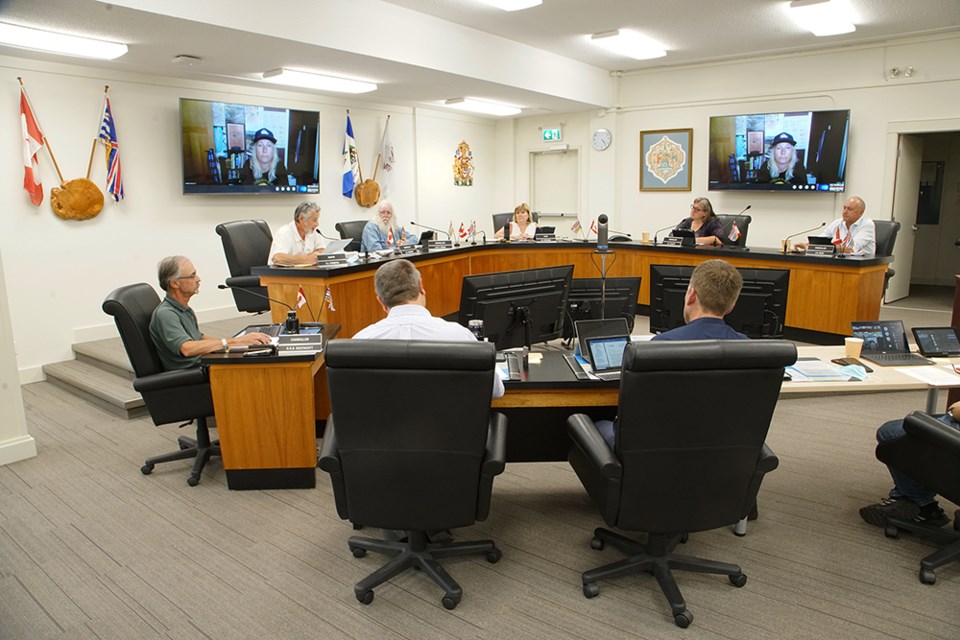City of Powell River council has named three elected officials to initiate discussions with Tla’amin Nation on the process regarding the possible change of the city’s name.
At the July 15 council meeting, councillors voted for mayor Dave Formosa and councillors Cindy Elliott and Maggie Hathaway to meet with Tla’amin representatives regarding the nation’s request to consider renaming Powell River, which came up at a meeting of city, Tla’amin Nation and qathet Regional District elected officials in May.
Powell River was named after Dr. Israel Powell, who was BC’s first superintendent of Indian affairs. According to a letter to council from Tla’amin Nation hegus John Hackett, Powell was instrumental in carrying out the residential schools policy and is credited with outlawing the potlatch.
At the July 13 committee of the whole meeting, councillors considered four items pertaining to the proposed renaming of Powell River.
The first item for consideration was the June 21 letter from Hackett, which stated that if the city believes in reconciliation, it must disassociate Tla’amin homelands with the name of Israel Powell.
“This legacy has been devastating to our people, inflicting severe generational trauma and causing irreversible loss to our culture and language,” stated Hackett in the letter. “In light of the recent finding of a 215-child grave at the Kamloops residential school, and more being found daily at other schools, no one can deny the truth any longer that the atrocities our people faced under this appalling colonial policy are real.”
Hackett stated in the letter that Tla’amin is extremely concerned with the idea of having a referendum as a means to determine whether the name Powell River should be changed.
“A referendum has no place in this process,” stated Hackett. “Having the dominant culture decide whether the harms done to Tla’amin people and our rights outweigh their attachment to colonialism is a classic strategy to maintain the status quo. The correct approach for this process is to work collaboratively, government-to-government, with meaningful community engagement.”
Hackett stated the prospect of changing the name must not be a matter of if, but a matter of when.
“To suggest that a name change is simply a possibility and not an eventuality is to suggest that it is still appropriate to celebrate the legacy of residential schools and cultural genocide,” stated Hackett.
He stated that Tla’amin is prepared to establish a joint committee process to advance this work.
“In the spirit of reconciliation and qathet (working together), let’s find a more respectful and inclusive name that is more reflective of both the oral history of these lands and the present-day collaborative communities.”
Councillors vote to receive letter
Councillor George Doubt made a motion to receive the letter.
Councillor Cindy Elliott said she wanted to acknowledge and thank Hackett for sending the letter.
“I’m really looking forward to the conversations that come out of this process,” said Elliott.
Councillors voted to receive and file the letter. Councillors also voted to receive and file correspondence received from the public on the matter.
Mayor Dave Formosa then spoke and recommended that he, Elliott and Hathaway meet with the nation, which had to be ratified at the July 15 city council meeting.
“Let’s talk about a process,” said Formosa. “Let’s not talk about an end date or a referendum. Let’s not talk about anything other than education and communication of something that is very important to our friends. Let it take as long as it needs to take.
“We need a process, so that’s what I’m asking for today, for us to have a conversation with our friends,” said Formosa.
Councillor George Doubt said it’s time for the discussion and the truth has been recognized about what has gone on in the past. He said a process of reconciliation could be worked at and that the city should get on with it.





